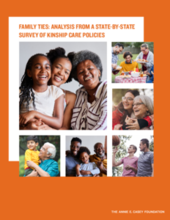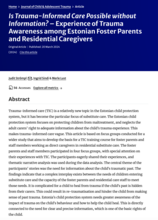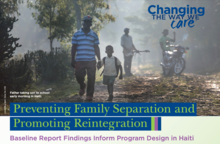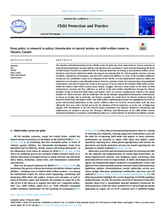Displaying 411 - 420 of 14551
A comprehensive survey of kinship care policies identifies increasing efforts by states, the District of Columbia and Puerto Rico to promote kinship care and support kinship caregivers of children and youth who are known to the child welfare system.
This study aimed to investigate the state of transformation of the child welfare service providers for neglected children in the City of Bandung as a parameter to understand the progress of the deinstitutionalization process in Indonesia.
This article is based on focus groups conducted for a wider study that aims to develop the basis for a trauma-informed care training course for foster parents and staff members working as direct caregivers in residential substitute care in Estonia.
Prévenir la séparation des familles et favoriser la réinsertion familiale est une enquête de base menée par Changing the Way We Care Haïti visant à informer la conception d'un programme de réforme des soins axé sur la prévention de la séparatio
This is a comprehensive baseline survey by Changing the Way We Care Haiti aimed at informing the design of a robust care reform program focused on averting family separation and fostering sustainable reintegration.
The survey results presented in this report highlight increasing efforts by states, the District of Columbia and Puerto Rico to promote kinship care and support the caregivers of children who are known to the child welfare system. At the same time, the report calls on states to do more to help willing kin caregivers access and benefit from foster care licensing.
In this article, the authors present considerations related to the global mandate for child protection and the challenges that persist amongst marginalized communities. Subsequently, they focus on Canada and, in particular, the Ontario example: the trends from the Ontario Incidence Study of Reported Child Abuse and Neglect (OIS). This child welfare epidemiological project has highlighted the need for greater intersectional adjustments to best protect children, where the iterative research-policy cycle has most effectively been seen with a formal system for the inclusion of lived experience, as in the case of Indigenous peoples.
The long-term consequences of COVID-19 have been tough for children around the world, but even more so for young children already in humanitarian crises, whether due to conflict, natural disasters, or economic and political upheaval. Drawing on research and voices from the Global South, this book showcases innovations to mobilize new funds and reallocate existing resources to protect children during the pandemic.
A teenage orphan who became a posterchild for Moscow's deportation of Ukrainian children to Russia said he was instructed by officials to recite pro-Russian talking points for television cameras and threatened with a beating when he complained about conditions.
A Book Launch Event Examining Innovations and Lessons from the Global South







